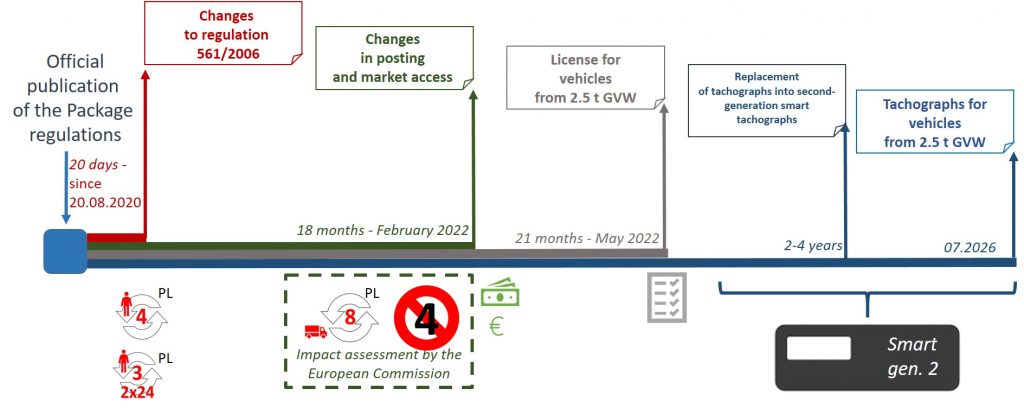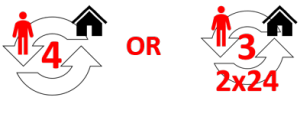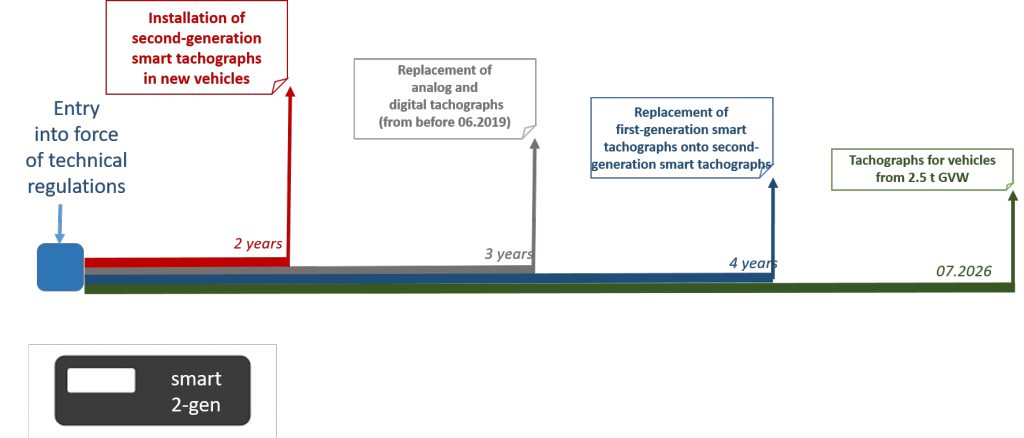
Get ready for the Mobility Package with the Inelo Group
The Mobility Package is a set of legislation proposals aimed at regulating road transport in the European Union. It does not introduce new legal acts, but only changes the existing ones. Legislative work began in 2017 – the current fourth version of the regulations is a compromise between the European Commission, the European Parliament and the Council of the European Union reached on 11.12.2019. The mobility package was finally passed on 8th July this year, and on 31st July the regulations were published. The changes that Polish transport will have to face may significantly increase costs and reduce the competitiveness of Polish companies. Experts of the Inelo Group will help you to find out how to prepare and what short- and long-term strategy to adopt. We encourage you to visit our website regularly and follow your Facebook profile.
The Mobility Package provides for changes in three important areas:
- Drivers’ working time, as well as design of and operating the tachograph.
- Posting drivers and minimum wages.
- Access to the market, i.e. the rules of conducting transport business in the European Union.

Legal regulations
When will the new rules become effective?

What changes should be expected in the near future?
20 days after publication in the Official Journal, i.e. since 20.08.2020
- Mandatory return of the driver to the operations centre (base) or the driver’s place of residence every 4 weeks:
- Return for at least 45 hours;
- If two shortened weekly rests are taken when on the road – return before the next regular weekly rest (every 3 weeks).

- Tightening the rules on shortened weekly rests. An international driver may take two reduced weekly rest periods in a row (2x24h) under the following conditions:
- He/she started at least two shortened weekly rests abroad;
- Two regular and two shortened weekly rests were taken in every four weeks;
- After two shortened weekly rest periods the next rest should be a regular weekly rest, preceded by compensation for the two previous shortenings – at the base or place of residence (documenting the return/place is required).

- Specifying and emphasizing the prohibition of taking regular weekly rest periods in the vehicle cabin:
- The prohibition applies to regular weekly rests and stops lasting more than 45 hours (e.g. due to compensation taken);
- Additional assumption that 45-hour rests take place in a place friendly to all genders with appropriate sanitary and sleeping facilities.
- Possibility to extend the daily and weekly driving time by a maximum of 1 or 2 hours when returning to the base or home for a weekly rest:
- The need to document the deviation from the regulations and special circumstances, as in the case of Art. 12/561/2006 (additional paragraph in Art. 12)
- Extending the driving time by 2 hours, only if the driver takes an additional 30-minute break before this period and returns for a regular weekly rest – 45h;
- Obligation to compensate for this time with any other rest period within 3 weeks;
- No possibility to rely on the paragraph in question if the rules of weekly rests are violated.
- Other important changes:
- The possibility of interrupting weekly rest periods – 24h and 45h on the ferry (for 45h additional conditions must be met – 8h trip and a sleeping cabin).
- Additional exemptions from 561/2006, e.g. vehicles transporting ready-mix concrete.
- Other changes, e.g. obligation to register returns, country symbols on record sheets, change of rules for breaks for the crew.
Want to know more details? Order a call with our expert

18 months after publication in the Official Journal, i.e. February 2022
- Posting
- a) Exclusion from posting:
- Transit;
- Bilateral transport (from/to PL) plus up to two additional operations
- b) Posting covers:
- Cross-trade (transfers between countries other than the company’s headquarters, e.g. transport carried out by a Polish company on the route from Germany to France);
- cabotage.
- c) Simplification of obligations:
- No need to appoint a representative;
- Translation of documents only into English;
- Electronic documentation.
- d) Hindrances:
- Use of full collective agreements (increased wage costs, as well as difficulties in accounting);
- It is not possible to include allowances and lump sum payments (the amounts of allowances related to a business trip cannot be included in the minimum wage);
- The possibility of losing reputation for not following the guidelines.
- Access to the market
- a) Return of each vehicle to the company’s operations centre in the country of headquarters once every 8 weeks at least.
- b) Cabotage:
- The current rules are maintained (international transport, 3 operations and 7 days);
- An additional 4-day break period between cabotages with the same vehicle, taking into account the country;
- c) The possibility of losing reputation for not following the guidelines.
- Easier inspection
- a) Obligation to enter the country in the tachograph after crossing the border (only in the EU) for analogue tachographs from 20th August 2020, and from May 2023 for digital tachographs:
-
- In the first place that is possible and safe to stop;
- The driver enters the code of the country he/she is entering;
- Inspection of the minimum wage, cabotage and return of drivers and vehicles.
21 months after publication in the Official Journal, i.e. May 2022
- Buses from 2.5 tons of GVW in international transport of goods and cabotage
- a) 21 months from the publication of the regulations:
- For commercial transport, they meet the requirements for the occupation of road transport operator and obtain a license;
- Financial security requirement – 1,800 euros for the first vehicle, 900 euros for each subsequent one.
- b) From 1 July 2026:
- Obligation to comply with all guidelines of 561/2006/EC;
- The requirement to install and use a tachograph.
- Another version of smart tachographs
- a) Installation in new vehicles – 2 years after the technical regulations become effective.
- b) New features:
- Automatic registration of crossing a border;
- Registration of loading/unloading locations;
- Registration of the type of transport (persons or goods).
- c) Mandatory replacement with second-generation smart tachographs in international transport – no possibility to update currently known devices.
Mandatory replacement with second-generation smart tachographs in international transport

Want to know more details? Order a call with our expert

